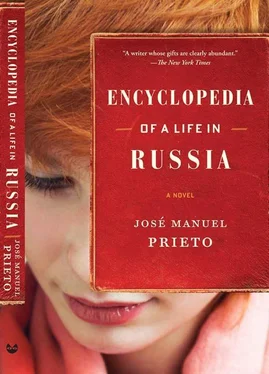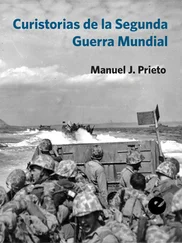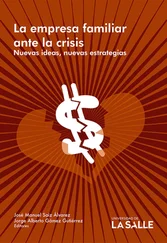But PETER is credited with an even more horrendous crime: that of having introduced the discordant note of the batiste handkerchief into the simple world of the boyar caftan. For this daring and premeditated attack against the patriarchal order of the Grand Duchy of Muscovy, he would never be completely forgiven. A life-size sculpture of him done in wax is on display in the Hermitage: a man of great stature, he rises high on narrow calves, stoit na kostiah . He’s dressed in the cosmopolitan garb he brought back from his trip to Europe: the scandalous square-toed Dutch shoes with buckled arches and heels of painted wood (no more of those Asiatic buskins with the tips of the toes curling back!); his skinny tibia clad in stockings, matador-style, held up by a simple garter; close-fitting breeches of blue wool; the bow tie of fine silk; and the brocade frock coat adorned with a double row of buttons (no more of those caftans reaching all the way to the floor!); a sparse beard; a small and impertinent mustache; and, finally, a tricorne (no more of those floppy woolen caps!) atop a wig of powdered curls.
One winter afternoon in 198* I visited the pantheon of the Romanov family in the cathedral that stands within the walls of the Peter and Paul Fortress. I was accompanied by T**, a friend, who had insisted on showing me PETER’S sepulchre. Frozen stiff, our hats pulled down on our heads, we approached a group that was receiving the usual litany from a guide’s lips: PETER I, the good CZAR who founded a city, distributed land and organized the Russian army. . When he reached the point of the city built na kostiah . . I, who was hearing the story for the first time, was horrified and sought clarification of this turn of phrase — figurative or literal? — from my friend. Our whispers caught the guide’s attention and he lifted his head (which had been downcast by the useless sacrifice of thousands of Russian souls) and detected ours, with hats on. Then, without preamble or introductory note, like a sports car going from zero to ninety-five kilometers an hour in the span of ten meters, he thrust his sacerdotal index finger at us: “They haven’t bared their heads before PETER!” and waited for everyone to turn and look before repeating with a hiss: “They haven’t bared their heads before PETER!”
Then he stared at me and proffered from between clenched teeth: “NERUS! What can we expect from a NERUS.” This statement entirely overlooked the fact that PETER I had reigned over an IMPERIUM that included millions of NERUS, even as it affirmed the immortality of PETER I, the only surviving CZAR.
PSEUDO DEMETRIUS. In Russian, for “imposter,” they (we) have the word самозванец, samozvanets, “ he who gives a name to himself,” a very conceptualist idea, we’d say today. In 1602, PSEUDO DEMETRIUS revealed himself to the monks of the Kiev Pechersk Lavra as the CZAREVITCH Dimitri, son of Ivan the Terrible, believed to have been murdered on Boris Godunov’s orders. He pushed back the hood of his habit, stabbed his index finger at his chest, and gave himself a name. But his “sheep’s eyes” ran in despair across the vast field of his face and the monks expelled him willy-nilly. When the figure of Grigory Otrepyev was no more than a distant point far down the Dnieper river, the prior SPAT in rage and baptized him without needing to consult the book of saints: imposter .
Neither beard nor mustache grew on Grigory’s face. He was small in stature, disproportionately broad of shoulder, and short of neck. He was, moreover, five years older than the CZAREVITCH, who was, in fact, murdered in Uglich. Nor did he suffer from epilepsy, and, as we’ve seen already, he had to struggle grimly against a physiognomy that often betrayed him. The only things that distinguished him were his beautiful CALLIGRAPHIC handwriting and his undoubted talent as a con artist, for he had discovered a gold mine, a vacant niche in the pantheon of Russian gods.
Mortal enemy of mirrors, he marches to Poland, where God himself places in his path a beauty, Marina Mniszech, who comes to close the circle: beauty and the beast. (I’ve invented nothing here; this is the most astonishing story I heard in Russia!) While we do not know with certainty how he managed to win her favor, it would appear that she yielded to a promise that overran the narrow limits of a Polish maiden’s imagination: “You shall be empress of Russia.” A truly powerful oath; any woman would have lost her head. (Two centuries later, even Catherine the Great, on the night of the coup d’etat that brought her to the throne — the soft thump of the pillow over the mouth of the sleeping Peter II — paced nervously until dawn. When at last she was informed of the operation’s success, the news would turn out to be somewhat imprecise, for it omitted the corollary that from Peter II’s still-warm body the ethereal copy of an imposter had detached itself, as in a Disney cartoon, leapt into the garden, and spurred its steed away: two ghosts, rider and steed, to whom Catherine would never give chase.)
Grigory, the samozvanets, embraces the Catholic faith and thus obtains the support of King Sigismund II and the Knights of the Teutonic Order. When he crosses the border into Muscovy, Grigory is weaving, day and night, the delicate fabric of a correspondence composed in his painstaking copyist’s CALLIGRAPHY. Epistles that projected over the snows of the north, the forests, and the STEPPE, the austere gaze, the lofty brow, the energetic chin of a CZAR who, without firing a single blunderbuss, without so much as a clash of spears, entered victoriously into Moscow, the third Rome.
When Gudonov’s strelitzi stormed the Kremlin eleven months later, PSEUDO DEMETRIUS had already drunk deep of the true loveliness of Marina, the beautiful. (I don’t know whether it’s due to this that Polish women even today enjoy an inalterable reputation as great beauties: писаные красавицы.) My sources shed no light on the final destiny of the woman who was, without the shadow of a doubt, the most beautiful CZARINA of Muscovy. (Catherine the Great, née Catherine Anhalt-Zerbst, was a thickset German frau. )
On May 16, at dawn, PSEUDO DEMETRIUS, like a quick-change artist fleeing from a burning theater, flung his CZAR mask to the floor and fled in terror down the Kremlin’s long passageways, the redness of his face in crescendo. Cornered in a hallway in the north wing, he breaks down the heavy shutters with a kick of his rose-colored buskin and thinks of the contrast between the hard oak boards and Marina Mniszech’s white breasts. Then he jumps — his once unfathomable credit in the coffers of good luck now reduced to zero — and idiotically dislocates his ankle. Forty-eight hours of life remain to him, enough time for him to be chained, burned alive as an example, and have his ashes stuffed into a cannon with an equal measure of gunpowder: the thundering salvo. . Over the course of the following year, the cloud that emerged from the cannon’s mouth traveled all the way around the globe to precipitate once more, in the summer of 1607, into the human mold of PSEUDO DEMETRIUS II, atomically identical, the next chapter in the interminable history.
RADIO TORTURE. I’m visiting a friend’s home for the first time. I ring the doorbell (there are many different types of doorbell in the IMPERIUM: chirping birds, a concierge’s squawk, do-re-mi chimes — any of those). Inside, I’m given a very cordial welcome. There’s talk of a two-week stay, a month if necessary. That night we stay up late conversing and I go to bed dead tired. At six the next morning, an announcer’s thunderous voice brusquely drags me from an apolitical dream and, with my soul in an uneasy state of suspension, I become aware of the successes of the industrial production sector in Western Ukraine followed by various other industrial feats achieved in the region of the Sea of Japan, then hear a summary of the international news followed by a men’s chorus from Georgia. They must have forgotten to turn the RADIO off last night, I think. At eight — having missed two hours of much-needed sleep — I am nevertheless tense, ready to form ranks, and fully aware of what is going on in the world.
Читать дальше












